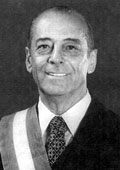João Baptista de Oliveira Figueiredo was the son of General Euclides de Oliveira Figueiredo, who was exiled after an attempt to topple a dictatorship in 1932. After studying at military schools of Porto Alegre and Realengo, Figueiredo was promoted to captain (1944) and to major (1952). He served in the Brazilian military mission in Paraguay (1955-1957) and worked for secret service of the Army General Staff (1959-1960). In 1961 he was transferred to the National Security Council. While teaching at the Army General Staff Command College (1961-1964), Figueiredo was promoted to colonel and appointed the department head in the National Information Service. In 1966 he assumed the command of public defense force in São Paulo. In 1967-1969 he commanded a regiment in Rio de Janeiro and was promoted to general. When General Emílio Médici assumed the presidency, Figueiredo was appointed head of the president's military staff (30 Oct 1969 - 15 Mar 1974). In 1974 he assumed the leadership of the National Information Service (15 Mar 1974 - 14 Jun 1978), a Brazil's internal security agency. Picked by President Ernesto Geisel as potential successor, Figueiredo defeated opposition candidate, General Monteiro, and continued the gradual abertura (democratization) process instituted in 1974. An amnesty law, signed by Figueiredo on 28 Aug 1978, amnestied those convicted of "political or related" crimes between 1961 and 1978. In the early 1980s, the military regime could not effectively maintain the two-party system established in 1966. The Figueiredo administration dissolved the government-controlled National Renewal Alliance Party (Aliança Renovadora Nacional [Arena]) and allowed new parties to be formed. In 1981 the Congress enacted a law on restoration of direct elections of state governors. The general election of 1982 brought victory to Arena's successor, pro-government Social Democratic Party (43.22% of the vote), and to the Brazilian Democratic Movement Party (42.96%). The governorship of three major states, São Paulo, Rio de Janeiro and Minas Gerais, was won by the opposition. However, the political developments were overshadowed by economic problems. As inflation and unemployment soared, the foreign debt reached massive proportions making Brazil the world's biggest debtor owing about US$90 billion to international lenders. The austerity program imposed by the government brought no signs of recovery for the Brazilian economy until the end of Figueiredo's term. The president was often incapacitated by illness and took two prolonged leaves for health treatment in 1981 and 1983, but the civilian vice president Antônio Aureliano Chaves de Mendonça did not enjoy major political power. The opposition vigorously struggled for passing a constitutional amendment to allow direct popular elections in November 1984, but the proposal failed to win passage in the Congress. [1] |

